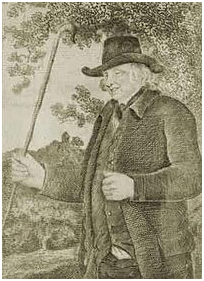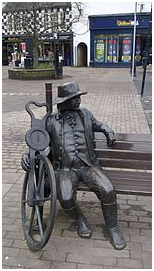Hollins Hill, now the Haworth, was built to stand proud above the main thoroughfare between Manchester and The Ribble Valley. Manchester Road (the A680), threads neatly northwards through the hills of Baxenden, passing Hollins Hill, and into the valley of Accrington’s centre before climbing again towards Harwood and on towards Whalley.

Blind Jack lost his sight to smallpox at the age of six. But this didn’t stop him leading a full and fascinating, if sometimes fraught, life. He earned his early living as a fiddle player, playing in local inns, then as a goods carrier, which helped him master the geography of the region. Jack used his transportation expertise to help the English army mobilise its weaponry around the Scottish Highlands during the Jacobite Rebellion of 1745. He was captured by Bonnie Prince Charlie’s adherents and court martialed as a spy, but was acquitted on grounds of too little evidence. A narrow squeak, and further testament to Jack’s seemingly unbounded resourcefulness.
Not only was Jack prolific and successful in his road-building career – he built around 180 miles of turnpike road, mainly throughout northern England – he was also extraordinarily inventive. He devised a method of packing his roads with heather and gorse bundles to get them across marshy terrain, which gave him a significant advantage over his competitors. Jack built roads in five counties and his roadbuilding career would last for decades, but Manchester Road, completed in 1791, turned out to be the last of Jack’s turnpike roads.

Stagecoaches traveled the turnpike for those who could afford them, revolutionising longer distance travel along the national network of turnpikes. A century later, trams would ply the route between Bash at the top of the hill and Accy at the bottom. But that’s for future posts! Stay tuned…



Briliant insight Louise.
Thanks, Christine, lovely to hear from you, but the credit is all Roger’s! Do please keep reading. We love our readers!